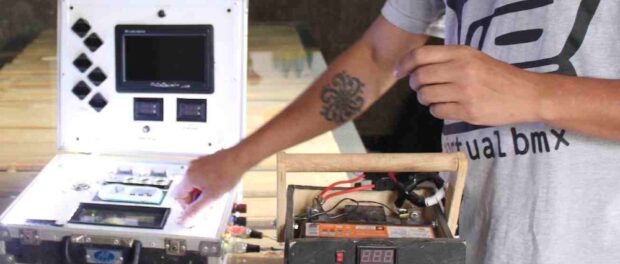
The seeds for the Favela da Paz Institute were planted 27 years ago when Claudio Miranda began playing samba with his friends in São Paulo favela Jardim Ângela. They made their instruments out of repurposed trash, metal and buckets because it made financial sense, but this knack for sustainable practices grew into a samba band called Poesia Samba Soul and a sustainable community known as Favela da Paz.
Inspired by a visit he took in 2009 to the Tamera “School and Research Center for a Realistic Utopia” in Portugal, Miranda founded the Favela da Paz Institute, an umbrella organization which houses the samba band, Poesia Samba Soul, and their recording studio; Sustainable Periphery, an environmental education project begun in 2010 which provides tours and classes on how to replicate their community model; and Project Vegearte, an educational initiative to promote healthy food and sustainable cooking using biogas.
Claudio’s brother Fábio Miranda de Moura left his job in 2010 to dedicate himself full-time to developing Sustainable Periphery. On tours, he leads visitors through the Poesia Samba Soul studio. “After we formed our band in 1989, we started giving classes until we reached the point where we had 300 students. They started their own bands, but up to that point they had no recording space and neither did we, so at that point we had the idea to build the studio, even though we had few resources,” Fábio remembers. To cut costs and reduce pollution, they built the studio using 80% repurposed materials, including a marble bar counter and old guitars and drums which have been turned into lamps. Pipes near the ceiling and floor which connect to the outside circulate air to keep the studio fresh without the need for costly and energy-consuming air conditioning.
Sustainable Periphery uses the mottos #BeSustainable and #BeFunctional to spread the message that it is possible to live sustainably with few resources, using practical knowledge that doesn’t require a fancy degree to develop do-it-yourself projects. They provide tours and workshops to school children and adults on the self-taught methods the organization has used to “green” the seven homes in the Favela da Paz complex.
Projects to date include a biodigester which contains an anaerobic bacteria to convert the organic waste the complex generates into methane gas. The biodigester also produces a fertilizer which a water pump directs into a hydroponic system made of PVC pipes where herbs and salad greens grow. A spiral solar water heater on the roof provides for showers, rainwater collects in tanks storing 800 liters, and most of their energy is solar. Project Vegeart led by resident Hellem Fernandes runs workshops on healthy and sustainable cooking for children in the kitchen.
To help finance the project, Vegearte sometimes provides a catering service, and Poesia Samba Soul goes abroad on tour most years, having played in fifteen different countries. On trips overseas they have participated in knowledge exchanges with similar community initiatives, like Tamera in Portugal and the Peace Community of San José de Apartadó in Colombia. They form part of Tamera’s Global Campus initiative, a solidarity network of 6 projects including partners in Mexico, Kenya and Israel-Palestine who participate in monthly calls and meet for retreats to exchange advice, support and updates on their projects’ advancements towards peace in their communities. Favela da Paz frequently receives guests from around the world interested in sharing and learning from their model.
This year, Poesia Samba Soul has chosen not to travel. They are currently working on promoting their music locally and building a new educational center and residence they hope will be the first LEED certified self-sustaining building in Latin America near their current location. “The space will hold workshops, shows, theater, dance, music studios and the first vegetarian restaurant in the community. The entire building will run on biogas, there will be solar energy, and the green roof will provide space to plant produce as well as write poetry. It will be the poetic corner of Jardim Ângela,” Claudio told Olhar TVT.
“Most of the news that is shown in newspapers and on TV is about negative things that happen in the neighborhood. But that’s not what it is like here. People who live here are proud. Our project has become a positive reference for this place, not only in Jardim Ângela, but also in São Paulo,” he says.
Fabio says Favela da Paz has no political party, because politicians only show their faces during the election season. “We saw that we don’t need the public sector to develop our project. We have hands, we have heart and we have people with good intentions, and that is what is most important. Because the relationships you develop with people are stronger than politics. Politics only last four years. The relationships you make with people, with the community, last for life.”



